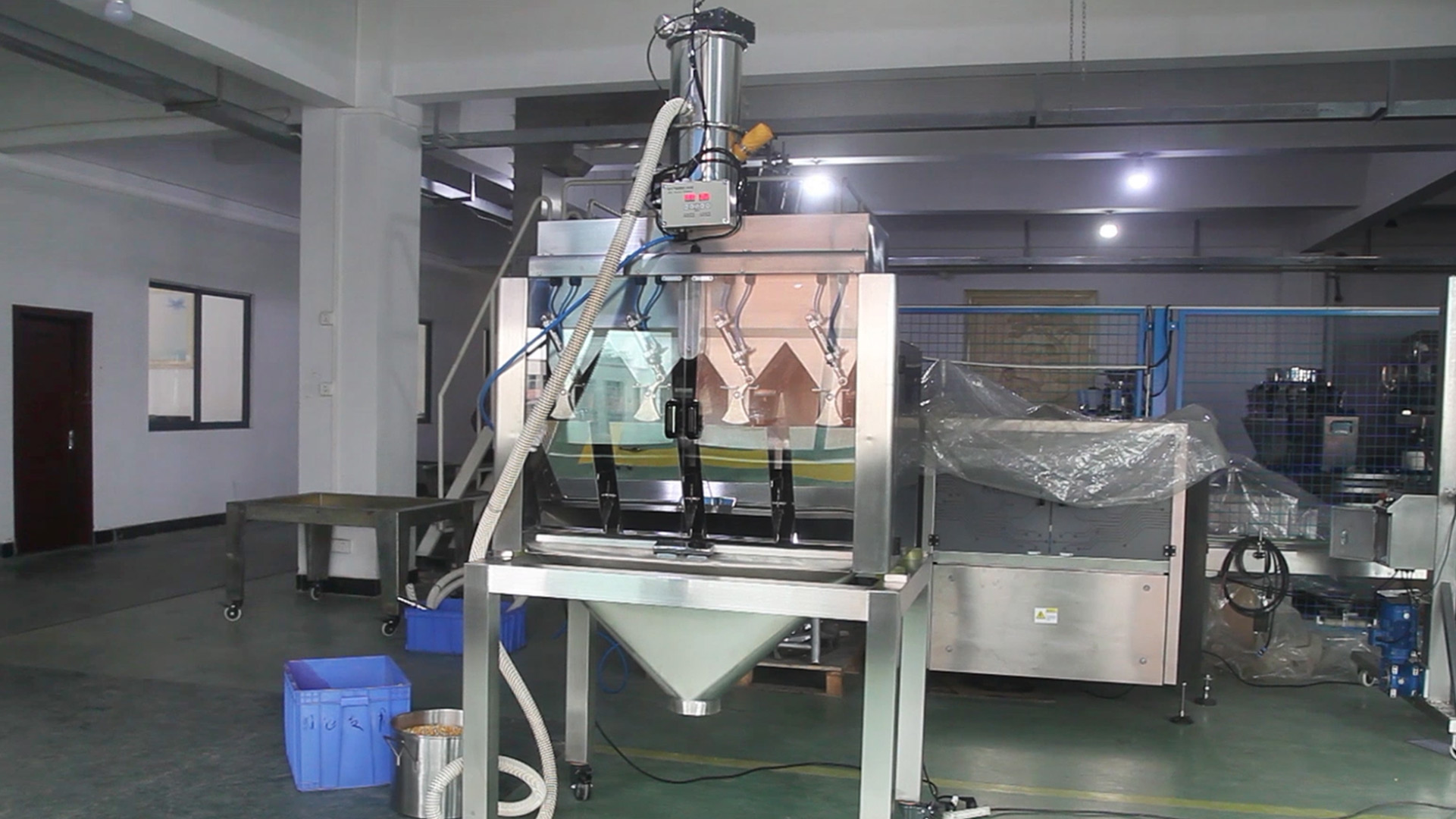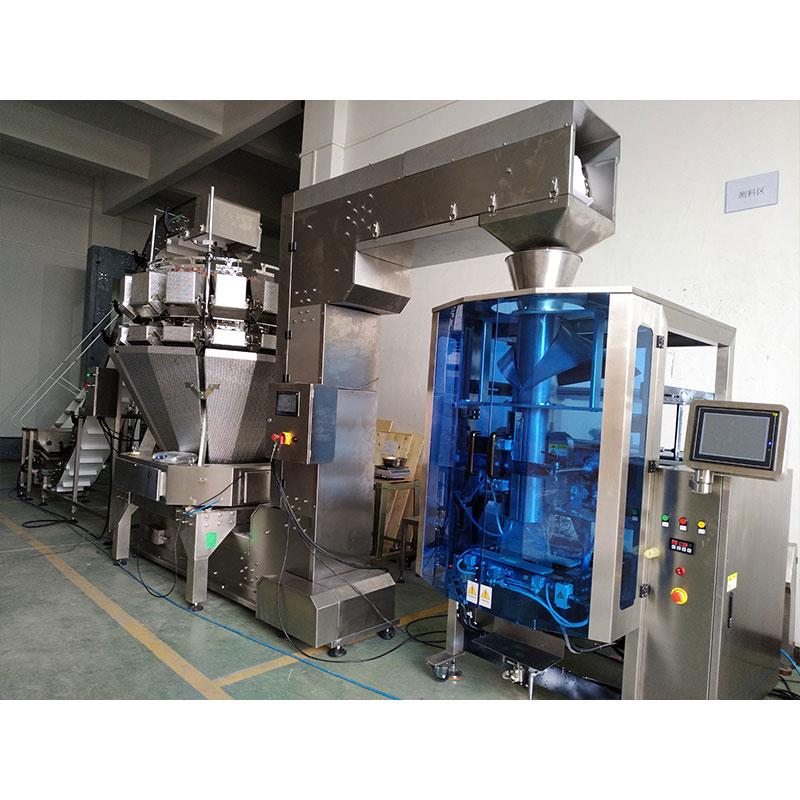Food Packaging Machines for Industrial Use: A Complete Guide
- What Are Industrial Food Packaging Machines?
- Main Types of Food Packaging Machines Used in Factories
- 1. Vacuum Food Packaging Machines
- 2. Dry Food Packaging Machines
- 3. Snack Food Packaging Machines
- 4. Tray Sealing and MAP Systems
- 5. Flow Wrapping Machines
- How to Choose the Right Packaging Equipment for Your Business
- Consider the following:
- Key Features to Look for in a Food Packaging Machine
- Essential features include:
- Benefits of Automation in Food Packaging
- Maintenance Tips for Long-Term Performance
- Routine maintenance checklist:
- Where to Find Reliable Food Packaging Machine Suppliers
- When evaluating suppliers, ask:
Discover Kenwei's complete guide on food packaging machines for industrial use. Dive into essential insights, types, and choosing the perfect machinery to optimize your production efficiency and ensure food safety.
In today’s fast-evolving food industry, efficiency, hygiene, and consistency are no longer optional—they are essential. Whether you're packaging snacks, dry goods, fresh produce, or vacuum-sealed items, a reliable food packaging machine is at the heart of every streamlined production line. For food manufacturers operating at scale, choosing the right equipment can dramatically affect product quality, operational speed, and bottom-line profitability.
This guide is designed to help you understand what industrial food packaging machines are, the various types available, and how to make informed purchasing decisions. If you're a factory operator, production manager, or distributor planning to buy food packaging machines, read on.
What Are Industrial Food Packaging Machines?
Before diving into equipment categories and features, let’s define what a food packaging machine actually is in an industrial context.
Industrial food packaging machines are automated systems used to wrap, seal, fill, and label food products for sale or distribution. Unlike manual or semi-automatic systems, these machines are built to handle high-volume outputs with minimal human intervention, while meeting strict food safety regulations.

They’re essential in sectors such as:
- Snack food production
- Dry goods processing
- Meat and seafood handling
- Frozen food packaging
- Ready-to-eat meals
What sets industrial machines apart from consumer-level or small-scale commercial devices is their durability, automation level, and integration capability with upstream and downstream systems. Many models include conveyor systems, weighing modules, nitrogen flushing, or even vision inspection features, depending on your production needs.
Main Types of Food Packaging Machines Used in Factories
The world of food packaging machinery is vast, with different machines designed for specific applications. Choosing the right type starts with understanding your product’s texture, shape, shelf-life, and desired presentation.
Let’s walk through the most common machine types used in food factories:
1. Vacuum Food Packaging Machines
Used to preserve perishable items by removing oxygen from the packaging. Commonly used in meat, cheese, seafood, and cooked products. These machines extend shelf life significantly and are a must-have in cold-chain logistics.
Typical features:
- Dual-sealing systems
- Gas flushing capability
- Stainless steel body for hygiene compliance
-

2. Dry Food Packaging Machines
Ideal for rice, beans, cereals, powders, and other shelf-stable dry products. These machines focus on minimizing product loss and improving bag consistency.
Common types include:
- Vertical Form Fill Seal (VFFS) machines
- Auger fillers for powders
- Linear or multi-head weighers
3. Snack Food Packaging Machines
Snack lines need to run fast and be versatile. A snack food packaging machine is usually equipped with:
- High-speed weighing
- Bag forming units (pillow, gusset, or quad seal)
- Nitrogen flushing to preserve crispiness
These are frequently paired with automated food packaging machines and conveyors for seamless operation.
4. Tray Sealing and MAP Systems
Ideal for fresh produce, ready meals, and meat. These systems seal products in pre-formed trays, often under modified atmosphere (MAP) to extend freshness.
5. Flow Wrapping Machines
Used for bar-shaped products like chocolate bars, protein bars, or bakery goods. These machines wrap items in a continuous film roll with high speed and tight seals.
Each type serves a specific function, and many manufacturers combine different machines into one automated food packaging machine line to maximize productivity.
How to Choose the Right Packaging Equipment for Your Business
Choosing the right commercial food packaging machine involves more than picking a model from a catalog. You need to align machine capabilities with your product characteristics, production speed, and packaging goals.

Consider the following:
- Product Type & Size Variability
Is your product solid, semi-liquid, powder, or granular? Will the machine need to handle different weights or sizes?
- Packaging Material Compatibility
Ensure the machine supports your intended materials—whether that’s plastic film, aluminum foil, laminated paper, or biodegradable packaging.
- Production Output Requirements
Match the machine’s speed (bags/minute or packs/hour) with your current and forecasted production demand.
- Automation Level
For higher volumes, opt for an automated food packaging machine with integrated weighing, filling, and sealing. This reduces labor costs and errors.
- Cleaning & Maintenance Needs
Choose machines with easy-to-clean surfaces, tool-less part removal, and CIP (Clean-In-Place) systems if you handle sensitive or allergen-containing products.
- Integration & Scalability
Can the machine be connected with ERP systems, metal detectors, labelers, or robotic palletizers?
- Compliance with Standards
Especially in export-oriented businesses, verify compliance with CE, FDA, or ISO standards.
By addressing these key points, you're more likely to invest in a food packaging machine that boosts efficiency and grows with your business.
Key Features to Look for in a Food Packaging Machine
Not all packaging machines are created equal. When evaluating equipment, focus on features that enhance accuracy, hygiene, uptime, and flexibility.
Essential features include:
- PLC Control Systems: User-friendly touchscreens with memory for multiple recipes.
- Stainless Steel Construction: Mandatory for food contact surfaces, especially in meat or dairy sectors.
- Servo Motors: Enable precise control of film feeding and sealing jaws.
- Film Tracking & Alignment Systems: Avoids packaging errors and waste.
- Multi-head Weighing: Accurate portioning for irregularly shaped or variable-weight products.
- Remote Diagnosis: Modern food packaging machine manufacturers often include remote monitoring for predictive maintenance.
The more adaptable the machine, the better it will handle changes in packaging design, weight ranges, or compliance needs.

Benefits of Automation in Food Packaging
The shift toward automation is not just a trend—it’s a necessity for staying competitive.
Here’s how an automated food packaging machine benefits industrial operations:
- Speed & Efficiency: Dramatically increases throughput compared to manual or semi-auto lines.
- Labor Cost Reduction: Fewer operators needed per line, especially with robotic components.
- Product Consistency: Minimizes variation in weight, seal integrity, and appearance.
- Reduced Waste: Precise cutting, filling, and sealing reduce film and product waste.
- Traceability & Data Integration: Machines can log batch codes, expiration dates, and operator actions.
For businesses scaling fast or targeting strict compliance markets, automation delivers both reliability and long-term ROI.
Maintenance Tips for Long-Term Performance
Even the best commercial food packaging machine will face wear and tear over time. Proper maintenance ensures your investment lasts and minimizes unexpected downtime.
Routine maintenance checklist:
- Daily: Clean contact surfaces and inspect for debris or film jams.
- Weekly: Check for air leaks, belt tension, and sensor alignment.
- Monthly: Lubricate moving parts, inspect sealing bars, and test backup systems.
- Quarterly: Update firmware/software, replace worn parts, and review production logs for anomalies.
Always refer to your food packaging machine manufacturer's manual for specific maintenance intervals. Using OEM parts and scheduling preventive service can significantly extend machine life.
Where to Find Reliable Food Packaging Machine Suppliers
Choosing the right food packaging machine manufacturers is just as important as selecting the machine itself. A quality supplier doesn’t just sell equipment—they offer consultation, installation, training, and ongoing support.
When evaluating suppliers, ask:
- Do they specialize in your product category (e.g., dry food packaging machine, snack food packaging machine)?
- Can they customize machines to meet your packaging size or line layout?
- What kind of technical support and spare part availability do they offer?
- Are machines factory-tested and certified to meet your region’s regulatory standards?
For global buyers, working with a seasoned supplier ensures smooth shipping, after-sales service, and local certification assistance. If you're preparing to buy food packaging machines, choose a partner that understands industrial-scale food production—not just machinery.
Looking for a trusted packaging solution partner?
Kenwei is a globally recognized food packaging machine manufacturer offering innovative, high-speed, and reliable equipment. Whether you need a vacuum food packaging machine, a dry food packaging machine, or a complete custom solution, Kenwei’s machines are built to meet the evolving needs of modern food factories. Contact them today to upgrade your packaging efficiency.




About After Sales Support
How about the after-sales service?
Warranty :2 years
Can I get remote troubleshooting assistance?
Yes, Kenwei offers remote troubleshooting for certain issues. Our technical team can guide you through diagnostics and help resolve issues via phone, video call, or online messaging.
About Solution suggestions
Can Kenwei provide solutions for high-volume production?
Yes, Kenwei specializes in high-speed, high-throughput machines designed for large-scale operations. Our multi-head weighers, packing machines, and check weighers.
How can Kenwei solutions help reduce waste in my production process?
Kenwei solutions improve accuracy in weighing, packaging, and quality control, reducing the chances of overfill or underfill. This leads to less product waste and higher operational efficiency.
About Logistics
How are large machines handled during shipping?
Large machines are typically shipped via sea freight using containerized shipping.

This type of weigher is designed to handle the unique characteristics of pickles, ensuring precise measurements for packaging and distribution. It uses a vertical single screw mechanism to feed the pickles into the weighing system, allowing for efficient and consistent weighing. This technology is particularly useful in food processing and packaging facilities where precise portioning is essential for quality control and customer satisfaction. This specialized equipment is perfect for accurately measuring and dispensing pickles in a production line or packaging facility. The vertical design allows for efficient and precise filling of containers, while the single screw feeding mechanism ensures consistent and reliable weighing.

This fully automatic box-type weighing and packing machine is designed for high-precision, high-efficiency packaging of snack foods, puffed products, and granular materials. The system integrates an automatic box dropper, inclined conveyor, multihead weigher, filling and labeling units, ensuring seamless feeding, weighing, filling, printing, and labeling. Ideal for candy, nuts, seeds, jelly, and more. Customizable to meet diverse production needs.

The system consists of a vibrating feeder, a Z-type conveyor, a 14-head combination scale, a material diverter, an automatic cup drop device, a cup mold conveyor, a capping machine and a finished product conveying device. It has high-precision filling capabilities and is suitable for a variety of mold cup combinations. It can realize fully automatic operations of feeding, weighing, filling, bag making, printing and finished product output, and is suitable for a wide range of materials with high production efficiency.

Contact Kenwei
Our company is located in areas with convenient transportation and developed economy. Our products are supplied in a timely manner. In the course of business operation, we always focus on customers.Have any questions or concerns about our products? Please leave us a message here, and our team will get back to you promptly.

Kenwei
Kenwei
Kenwei multi weigh
Kenwei
Kenwei
Kenwei